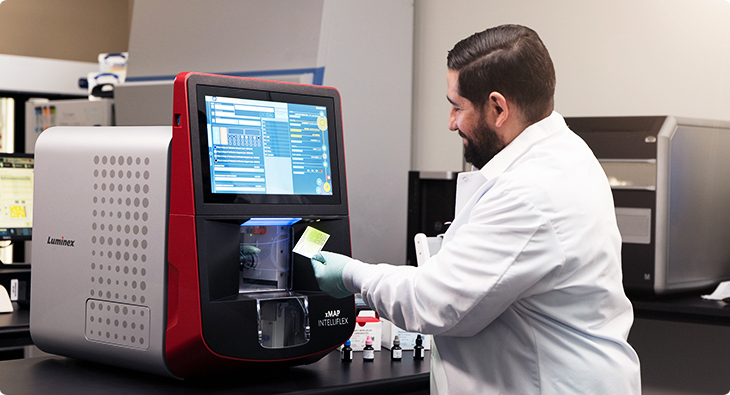Multiplexing can streamline tests for food allergies, autoimmune diseases, and more
With the fall conference season already gearing up, we can’t help but reflect on the summer events we attended over these past few months. Most recently, Luminex representatives attended the annual meeting held by the Association of Medical Laboratory Immunologists (AMLI), which never fails to update attendees about news of the latest innovations and issues facing the diagnostic immunology field.

Once again, the VALID Act is center stage
AMLI 2022, held in Salt Lake City, brought together a community of healthcare providers, lab directors, clinical scientists, and commercial diagnostic developers for thoughtful dialogue and discussions about new breakthroughs. Once again, as it had been for clinical chemistry experts attending AACC 2022, the VALID (Verifying Accurate Leading-edge IVCT Development) Act proved to be a considerable concern within the diagnostic immunology community. There is apprehension across clinical laboratories about how this bill could affect laboratory-developed tests (LDTs) if voted into law. While tasking the FDA with LDT regulation has always been a hot-button issue among clinical lab professionals, there is great awareness of the pivotal role LDTs played in allowing healthcare teams to care for patients during the COVID-19 pandemic. AMLI attendees reaffirmed the need to ensure that patient care is always prioritized.
Many clinical lab users of Luminex assay platforms prefer the flexibility of creating their own LDTs based on xMAP® Technology. Luminex is closely monitoring the VALID Act so we can best support our customers in navigating LDT regulation as it evolves.
Despite LDT apprehension, progress promises a bright future
When AMLI attendees weren’t discussing the VALID Act, they were eagerly sharing reports on diagnostic performance for a range of tests. xMAP Technology is ideally suited for a
range of immunology needs—such as routine diagnostic testing for SARS-CoV-2 and
autoimmune diseases, as well as research studies to improve options for food allergy testing— and we focused on sessions related to allergy research. We found there were several exciting developments in food allergy testing, such as the promise of utilizing basophil activation tests to generate more sensitive and specific results than those derived from more traditional skin-prick or allergen-specific IgE blood testing methods.
xMAP®: a major player within immunology
We were honored to see so many Luminex partners sharing their xMAP-based diagnostic solutions for food allergy testing and other immunology needs. A customer from the University of Colorado spoke about using bead-based epitope mapping assays from our partner, Allergenis, in an effort to improve the accuracy of food allergy test results. In addition, Bio-Rad Laboratories hosted a seminar about HIV diagnostics featuring their xMAP-based multiplexed kit for HIV antigen and antibody detection. Thermo Fisher Scientific also gave a presentation about autoimmunity and data-driven approaches for analysis.
Of course, we would like to thank all the AMLI attendees who took time out of their busy event schedule to connect with us at our booth in the exhibit hall. We were excited to see so many researchers interested in learning more about xMAP multiplexing technology, as well as Luminex’s ability to support and streamline diagnostic and research needs within immunology using exponential speed and unmatched accuracy.